#Robin DiAngelo
Explore tagged Tumblr posts
Text
[“I think shame provides social capital to white people in a few key ways. First, it garners sympathy. In the era of self-care, shame is something we believe we shouldn’t feel. If shame says “I am bad” rather than “what I did was bad,” then, in a self-care/self-help framework, no one should feel shame because we are all inherently good. The “I am inherently good” mantra is amplified for white people because our goodness is systematically reinforced across society: “good” neighborhoods and schools being stand-ins for white, and white as a stand-in for ideal human. When that taken-for-granted yet unacknowledged sense of racial goodness is challenged, we feel attacked at our very core. Whiteness studies scholar Michelle Fine speaks to this moral insulation when she says: “Whiteness accrues privilege and status, gets itself surrounded by protective pillows of resources and/or benefits of the doubt; how Whiteness repels gossip and voyeurism and instead demands dignity.” White people seldom find ourselves without these “protective pillows,” and when we do, it is typically because we have chosen to temporarily step outside our comfort zones. Within our insulated racial environment we come to not only expect racial comfort but to also be less tolerant of racial stress. Expressing shame elicits comfort and relief as we turn to others seeking reassurance, in essence asking to be reminded of our goodness.
For white progressives, shame is seen as socially legitimate (or we wouldn’t express it), a sign that we care and that we feel empathy. This may be why we express shame so much more readily than guilt. Guilt means we are responsible for something; shame relieves us of responsibility. If I focus on what I did, I must take responsibility for repair. If I focus on what I am, it is impossible to change and I am relieved of responsibility.
In distinguishing shame from guilt, psychologist Joseph Burgo explains,
Although many people use the two words ‘guilt’ and ‘shame’ interchangeably, from a psychological perspective, they actually refer to different experiences. Guilt and shame sometimes go hand in hand; the same action may give rise to feelings of both shame and guilt, where the former reflects how we feel about ourselves and the latter involves an awareness that our actions have injured someone else. In other words, shame relates to self; guilt to others.
If guilt relates to external actions and shame to an internal or private state, we can begin to see why shame is the preferred narrative: it protects our positions within the status quo by making it difficult for anyone outside ourselves to address. (The “personal experience” narrative functions the same way; as soon as I invoke that what I am claiming is “just my personal experience,” it becomes private—something internal to myself that only I can know or understand and that therefore cannot be challenged by others.)
Second, it is hard to move forward when we feel shame, as shame tends to be paralyzing; shame actually excuses us from moving forward. What can we do when we feel so bad? We can’t act until we work through this feeling, and that will take time and resources. Of course, given the requirement of time and resources, most of us won’t work through our feelings at all.
Indulging in racial shame whenever we feel exposed (but only when we feel exposed) puts our focus on ourselves and away from those we may have harmed. In this way, shame functions to deny our power and excuse our paralysis, allowing us to indulge in a sense of our own victimization. Both bell hooks and Audre Lorde have noted that feeling bad about racism or white privilege can function as a form of self-centeredness in which white progressives turn the focus back onto themselves. Hooks considered shame to be the performance of whiteness and not an indicator that whiteness was being interrupted.
Feminist writer and independent scholar Sara Ahmed explains, “The shameful white subject expresses shame about its racism, and in expressing its shame, it ‘shows’ that it is not racist: if we are shamed, we mean well. The white subject that is shamed by whiteness is also a white subject that is proud about its shame. The very claim to feel bad (about this or that) also involves a self-perception of ‘being good.’” In other words, if I feel bad enough, I both demonstrate and retain my morality. Ahmed raises the question of whether anti-racism is really about “making people feel better: safer, happier, more hopeful, less depressed, and so on.” There is certainly much concern within anti-racist education about white people not feeling “too” bad lest they withdraw from engagement, and much time and attention is given to keeping white people in the conversation. This concern is heightened when the shame narrative emerges; we now must tread very carefully so as not to cause the person to disengage.”]
robin diangelo, from nice racism: how progressive white people perpetuate racial harm
925 notes
·
View notes
Photo

“Many of these [Critical Theory-based] movements initially advocated for a type of liberal humanism (individualism, freedom, and peace) but quickly turned to a rejection of liberal humanism.
The logic of individual autonomy that underlies liberal humanism (the idea that people are free to make independent rational decisions that determine their own fate) was viewed as a mechanism for keeping the marginalized in their place by obscuring larger structural systems of inequality.
In other words, it fooled people into believing that they had more freedom and choice than societal structures actually allow.”
-- Ozlem Sensoy and Robin DiAngelo, “Is Everyone Really Equal? An Introduction to Key Concepts in Social Justice Education"
In other words, explicitly anti-liberal, paranoid theories that deny all progress as a conspiratorial illusion.
#Ozlem Sensoy#Robin DiAngelo#illiberalism#antiliberalism#anti liberal#conspiracy theory#critical theorists#critical theory#liberal humanism#liberal ethics#faith#faith is not a virtue#wokeism#wokeness as religion#woke activism#woke#cult of woke#religion is a mental illness
21 notes
·
View notes
Text
January's Books
I've been thinking it might be fun to do a month-by-month look at the books I've read and thoughts about them. I read a whopping 12 books in January! This is a mix of winter break energy plus getting lots of Audible credits for Christmas.
Another Time, Another Place by Jodi Taylor
Martyr's Promise by Elizabeth Hunter
A Catalogue of Catastrophe by Jodi Taylor
Paladin's Kiss by Elizabeth Hunter
Once & Future by Cory McCarthy & A.R. Capetta
Sword in the Stars by Cory McCarthy & A.R. Capetta
Doing Time by Jodi Taylor
Hard Time by Jodi Taylor
White Fragility by Dr. Robin DiAngelo
A Psalm of the Wild-Built by Becky Chambers
Saving Time by Jodi Taylor
About Time by Jodi Taylor
I've provided in-depth thoughts below :)
I finished a re-read of Jodi Taylor's Chronicles of St. Mary's series. This is one of my all-time favorites, and it was a joy to read again. Also on Audible, the voice actor who reads them is one of my favorites. Hands down. She does great voices for each of the characters. By the end of the first or second book in the series, she has them down so well that you know who is speaking immediately.
I then read the the 2nd and 3rd novels in the Elemental Covenant series by Elizabeth Hunter. I'm really digging this new series and cannot wait for the next one to release! Elizabeth's world building is amazing, and I have read every single book in her Elemental world. That's 17 books, 8 novellas, and a short story, by the way. Can't recommend her work enough. She also has a few other series that I love like The Irin Chronicles and The Cambio Springs Series.
On the recommendation of my girlfriend, I picked up Once & Future and Sword in the Stars by Cory McCarthy and A.R. Capetta. They were a really fun sci-fi/fantasy YA experience about a reincarnation of the Arthurian legend. Arthur as a lesbian in space plus time travel? It was queer and nerdy and all around wonderful. I loved it!
I then dug back into Jodi Taylor's writing with her spin-off series about the Time Police from the St. Mary's world. The four books were seriously wonderful. I loved learning about each of the main characters. Jodi is also very good at getting me invested to the point that I find myself openly weeping over her stories. I really hope more books come out in that series.
Two more books! I read White Fragility by Dr. Robin DiAngelo. Well... most of it. I still have about an hour of listening. I definitely did a lot of chewing on ideas and reactions to this one. She does well as encapsulating the stumbling blocks to genuine conversations about race because of how White people are socialized. I think it's worth reading as a White person, which is the intended audience, but I think a Black American or other People of Color would find it elementary and waste of time for them.
Finally, a college friend recommended A Psalm of the Wild-Built by Becky Chambers and sent me a Kindle version. It is such a beautiful story about what it means to be alive and worthy. It's a sci-fi book about a future where robots have become sentient and chose to leave humanity behind to learn about the world, and humans have made due without that technology since. A human and a robot meet and go on a journey together learning about one another and life. It hit me right in the feels several times!
#reading#reader#January books#sci fi#fantasy#YA books#Elizabeth Hunter#Jodi Taylor#Cory McCarthy#AR Capetta#Robin DiAngelo#Becky Chambers#book review#book recommendations#books
5 notes
·
View notes
Text










#Why So Curious#White Fragility#Robin DiAngelo#Self-Development#Personal Growth#White Women's Tears#One Chapter A Day
8 notes
·
View notes
Photo

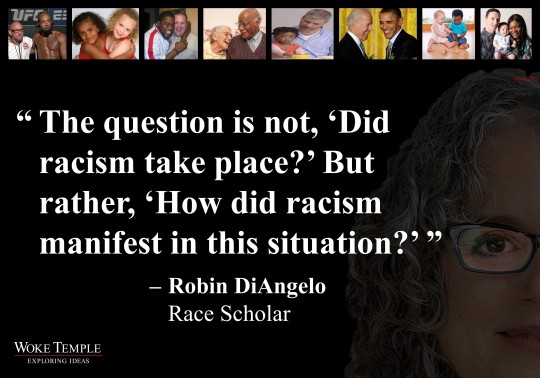
[ Source. ]
"Racism is not dead, but it is on life support - kept alive by politicians, race hustlers and people who get a sense of superiority by denouncing others as "racist."
-- Thomas Sowell
Racism has been on the decline in the west, including the US, for decades. No, it hasn’t gone away, and probably never will, but few black Americans regard it as one of their top issues.
Just as the Church invented “sin” and made it inescapable to foster constant guilt, even when you’re not even doing anything wrong and even as societies become more peaceful and less crime-riddled, rather than actually cure you of this undetectable illness, sell you on your need of the Church’s ongoing tithing-priced aura soul-cleansing and tune-up services...
... so too have race grifters like DiAngelo seen the demand for racism outstrip the supply and declared it, like sin, to be ever-present and inescapable. Her special formulation doesn’t even require the black person to have even been offended, nor the white person to have actually done anything wrong; it operates completely independent of people, and yet contradictorily, requires subjecting people to her preachments. So that she can sell you a training course or a book, not to actually resolve it, but so you can undertake “a lifelong commitment to an ongoing process of self-reflection, self-critique, and social activism.” “No one is ever done.”
Third-wave “antiracism,” like “salvation,” is a premium subscription service.
And there are few people less qualified to lecture others about racism than DiAngelo.
#The Woke Temple#Robin DiAngelo#quack scholarship#quackery#race grifters#academic fraud#crackpots#antiracism#antiracism as religion#wokeness as religion#cult of woke#woke activism#wokeism#woke#race hustlers#religion is a mental illness
43 notes
·
View notes
Text

JOMP BPC June 2: Currently Reading
#jompbpc#justonemorepage#currently reading#death’s end#liu cixin#ken liu#white fragility#robin diangelo#book spines#book photo challenge#books#mine
23 notes
·
View notes
Quote
If you think I'm effective at what I can articulate, it's from thousands of mistakes over the years, and trying to learn and grow from those mistakes. And it's also why the people of color in my life trust me is because they've seen me through that. They're not going to give up on me because my conditioning resurfaced. I don't think in my lifetime I will be free of my racist conditioning. And I don't actually call myself an anti-racist -- that's for people of color to decide if at any given moment I'm actually behaving in anti-racist ways. I often say try for less harm. Be thoughtful, but don't be so careful that you don't take any risks because that's just protecting you.
Robin DiAngelo, How 'white fragility' supports racism and how whites can stop it
292 notes
·
View notes
Photo


For white people who have just recently recognized their own complicity in America's racist systems and are looking to "fix" that — it's not going to happen overnight.
"It's a little bit like saying 'I want to be in shape tomorrow' ..." author Robin DiAngelo tells NPR’s Ari Shapiro. "This is going to be a process." DiAngelo’s 2018 book White Fragility explored definitions of racism, and white people’s defensiveness around those ideas.
Check out that conversation here.
-- Petra
#npr books#books#reading#white fragility#robin diangelo#nonfiction#author interviews#all things considered
261 notes
·
View notes
Photo


"Scholar.”
If you read White Fragility, you’ll learn nothing about society, nothing about how life works, nothing even about racism in America.
Because there is literally no evidence anywhere between the front and back covers for any of the assertions within. All you’re given is anecdotes where she says or does something facepalmingly stupid, then draws conclusions about the world - viewed through Critical Race Theory - and projects her character flaws onto everyone else.
Take the above quote. It’s not that she’s an astonishingly racist oxygen thief who fundamentally hates black people, it’s that all white people are as terrible as she is. It’s not that she’s a racist lunatic with no filter between the cesspool of her mind and her flapping cake-hole, it’s that that all black people are constantly offended by all white people.
Xians do the same thing. They tell non-believers that without belief in a god, they would be stealing, murdering and raping without guilt or remorse. This is supposed to be an indictment of human nature, but it’s just a confession projected onto everyone else.
The only things you’ll learn from reading White Fragility are: a) how completely screwed up she is, b) how her “scholarship” is nothing but the worst logical fallacies that would embarrass even Ken Ham, and c) how much better a person you are than she and her disciples.
It’s hard to believe that she’s held up as a beacon for addressing America’s concerns over race considering what a profoundly racist, appallingly awful person she is. This is your expert?
#The Woke Temple#Robin DiAngelo#White Fragility#no evidence#junk scholarship#academic fraud#whiteness studies#wokeness as religion#woke activism#cult of woke#wokeism#woke#religion is a mental illness
23 notes
·
View notes
Link
Underwood introduced the hotly-contested concept of microaggressions with a video of Air Force veterans explaining how they impact their day-to-day service. She then told the Board that racism begins as “a simple thought fueled by our narrow lived experience” before turning into “bias, and left unchecked, that bias can transform into microaggressive behavior.”
Underwood compared racism to a plant “whose roots are so firmly entrenched into social and economic systems that it becomes systemic racism.”
She claimed that “discomfort is to be expected” when discussing race, so people should “lean into that discomfort. Walk towards the discomfort, not away.” People discussing race must “engage in self-reflection and engage [their] own racial engagement and biases.”
DiAngelo argues that since white people are “so rarely ever uncomfortable,” they can easily be “throw[n]… out of our racial comfort zones,” by talking about race.
When Underwood asked the Board how VMI is creating a more equitable education for its cadets, President of the Board of Directors Bill Boland explained that the school is creating a new class “that will be part of our core curriculum, that includes issues related to racism, diversity, equity, and inclusion. Being in the core curriculum, that is a course that every student will have to take.”
“The president of the Board of Visitors is referring to a course that is in development titled ‘The American Civic Experience,’ which will be a history course required of all cadets. The proposed course will cover issues from the Civil Rights Movement including study of key Supreme Court cases related to civil rights as well as other constitutional principles,” a VMI spokesman told the Daily Caller.
The course will not be added into the curriculum before the 2021-22 school year at the earliest, the spokesman added.
Underwood asked Boland how he planned to “embed those competencies in all of your courses. Because I guarantee you in every single course there are class discussions. I encourage the board, encourage the faculty, to think about these conversations not as icing on cake to be scraped off if you don’t feel like eating the icing, but embedding them across content, across curriculum, and really thinking about building cadets’ capacity and their emotional intelligence to have these very complicated nuanced conversations.”
#VA#critical race theory#Virginia Military Institute#Robin DiAngelo#Daily Caller#military#colleges#Michael Ginsberg#Janice Underwood#White Fragility#emphasis added to original#microaggressions
7 notes
·
View notes
Photo
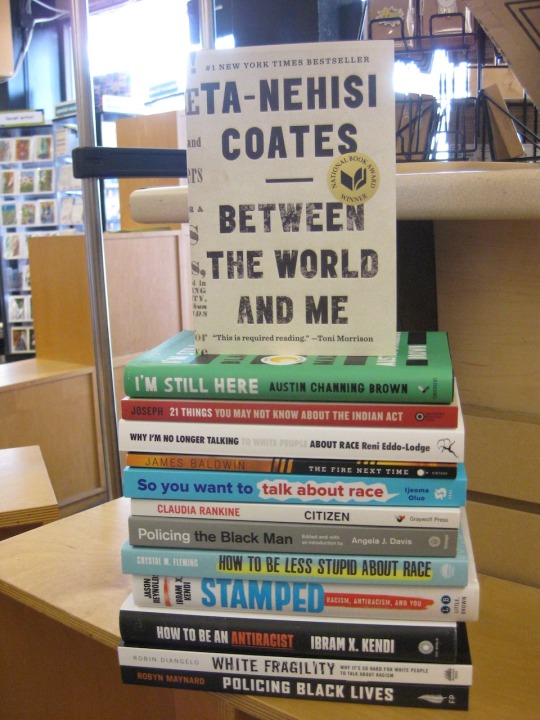
Vancouver! Your anti-racist reading list is now in store!
#book stacks#books#bookstores#indie bookstores#bookshops#anti-racism#book recs#Policing Black Lives#Robyn Maynard#White Fragility#Robin Diangelo#How to Be an Antiracist#Ibram X. Kendi#op stampede#Jason Reynolds#How to Be Less Stupid About Race#Crystal M. Fleming#Policing the Black Man#Angela J. Davis#Citizen#Claudia Rankine#The Fire Next Time#James Baldwin#Why I'm No Longer Talking to White People About Race#Reni Eddo-Lodge#21 Things You May Not Know About the Indian Act#Bob Joseph#I'm Still Here#Austin Channing Brown#Between the World and Me
66 notes
·
View notes
Text
“White Fragility” and writing
I’ve been doing a book study of White Fragility by Robin DiAngelo (highly rec to any white person—essential reading, I’ve been twisting everyone’s arm to read it), and part of it was really relevant to books. I need to think through how I’m managing this in my own writing, and I thought it might be of interest to some of you.
Another way that my life has been shaped by being white is that my race is held up as the norm for humanity. Whites are “just people”—our race is rarely if ever named. Think about how often white people mention the race of a person if they are not white: my black friend, the Asian woman. I enjoy young adult literature but am taken aback by how consistently the race of characters of color is named and how only those characters’ races are named.
To use an example from school, consider the writers we are all expected to read; the list usually includes Ernest Hemingway, John Steinbeck, Charles Dickens, Fyodor Dostoevsky, Mark Twain, Jane Austen, and William Shakespeare. These writers are seen as representing the universal human experience, and we read them precisely because they are presumed to be able to speak to us all. Now consider the writers we turn to during events promoting diversity—events such as Multicultural Authors Week and Black History Month. These writers usually include Maya Angelou, Toni Morrison, James Baldwin, Amy Tan, and Sandra Cisneros. We go to these writers for the black or Asian perspective; Toni Morrison is always seen as a black writer, not just a writer. But when we are not looking for the black or Asian perspective, we return to white writers, reinforcing the idea of whites as just human, and people of color as particular kinds (racialized) of humans. This also allows white (male) writers to be seen as not having an agenda or any particular perspective, while racialized (and gendered) writers do.
70 notes
·
View notes
Photo

Sandra Oh is a loser!
Here’s proof. Eight Emmy nominations. Eight Emmy losses. Day-um, Sandy! Is it time to consider a career change? Obviously you are always going to be a bridesmaid and never a bride. Still, what has she lost? A trophy? Who has she lost to? White women. And look at them now. When was the last time Katherine Heigl was relevant? Or even mentioned. But this has nothing to with race. Each and every one of these exclusively White, primarily blonde women were better than Sandra eight times. Tell me again that we have a meritocracy where the Best and the Brightest win all the prizes and get all the exclusive gigs like a major TV show’s writers room and if they ALL happen to be Caucasian, well that’s proof enough right?
I’m sorry, but not really, but I cannot hang with your presumptions of fairness when you are oblivious to how much race factors into who gets to be a winner and who gets to be cast as the loser.
You think that’s an accident? You’re so precious.
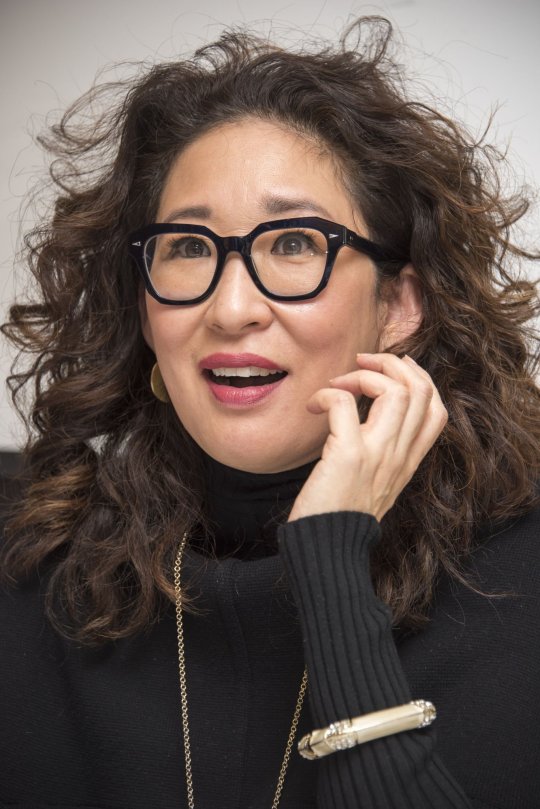
Racism has two primary functions: the oppression of people of color, which most people recognize, but also the simultaneous elevation of white people. You can't hold one group down without lifting the other up -- Robin DiAngelo/”White Fragility”
#Sandra Oh#Killing Eve#grey's anatomy#eve polastri#cristina yang#robin diangelo#white fragility#Emmy snubs
67 notes
·
View notes
Photo
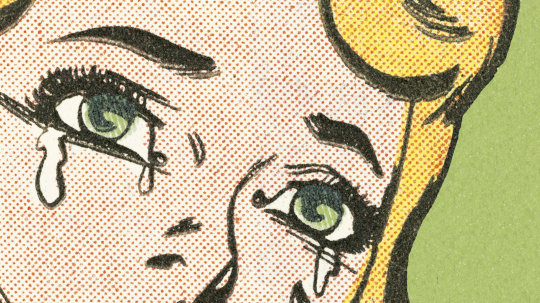

Image via CSA-Images/Getty Images
Our pals over at the Life Kit podcast talked to White Fragility author Robin DiAngelo about ways to disrupt the systems of racism we live in.
“It's important to recognize that all white people have been socialized into racist systems and it's inevitable that we all have blind spots,” she says. “It is akin to swimming with a current, rather than against it. Instead of asking if you've been shaped by these systems, ask yourself how you've been shaped by them.”
Check out that full conversation here.
-- Petra
88 notes
·
View notes
Text
By: Diana Soriano (Boston University)
Published: Mar 6, 2019
BOSTON — During a guest lecture at Boston University on Monday, University of Washington Professor Robin DiAngelo told the audience a “dangerous white person” sees people as individuals rather than by skin color.
DiAngelo, whose main field of work is “whiteness studies,” added that those who say they were taught to treat everyone the same deny black people of their reality, she said.
In making the claim, DiAngelo said she was lifting the terminology from her frequent co-facilitator at speaking engagements, black scholar Erin Trent Johnson.
DiAngelo’s comments were couched during a section of her talk[1] titled “What Does It Mean To Be White” that discussed colorblindness and those who say “I was taught to treat everyone the same, or some version of that.”
“If you are being honest, you’ve probably said it,” she told the audience, then added that in reality no one in the room was taught to treat everyone the same. “Your parents could lecture you to do it [but] you don’t do it, you can’t do it, there is no human objectivity.”
She said when she hears people talk about treating everyone the same, it tells her “this person doesn’t understand basic socialization. This person doesn’t understand culture. This person is not self-aware.”
“And I need to give a heads up to the white people in the room,” DiAngelo said. “When people of color hear us say this, they’re generally not thinking, ‘Alright, I’m talking to a woke white person right now.’ Usually some version of eye-rolling is going on, and a wall is going up.”
“My friend Erin Trent Johnson … she says, ‘When I hear a white person say this, what I am thinking is: ‘This is a dangerous white person. This is a white person who is going to need to deny my reality.’”
DiAngelo’s sentiments stand in stark contrast to a famous alumnus of school, Dr. Martin Luther King Jr., who earned his PhD in theology from Boston University and famously pronounced that he had a dream that his four children “will one day live in a nation where they will not be judged by the color of their skin, but by the content of their character.”
But DiAngelo placed a great emphasis on racial identity throughout the lecture, and dedicated a significant portion of her introduction to acknowledging the fact that she herself is a white person.
“I want to be clear that as I stand up here with authority and a voice on this topic, I’m reinforcing whiteness and the centrality of the white view,” she said. “I’d like to be a little less white, which means a little less oppressive, oblivious, defensive, ignorant and arrogant.”
She also stated she was “going to admit to things white people never admit to” and because of “implicit bias,” the white people in the room will be more inclined to listen to her.
She discussed how racism is systemic in the media, the family, religion, education, economics, language, and criminal justice. The common definition of racism as “an individual who consciously does not like people based on race and is intentionally mean to them” allegedly protects this system of racism.
She also talked about the rampant sexism this country faces. One slide of her presentation demonstrated that the majority of politicians, directors, and police officers are male, and that it is sexist for one to suggest that maybe men “just happen to be” more inclined to go into these fields of work.
“We live in a patriarchy,” she affirmed, and even asserted her own husband is a product of the patriarchy.
She encouraged the audience to think in terms of race, and not the character of individual people, because all white people are racist to some degree, no matter what.
DiAngelo is a frequent guest speaker at campuses across the nation, coined the term “white fragility,” and recently wrote a book[3] on the subject titled “White Fragility: Why It’s So Hard for White People to Talk About Racism.”
[ Via: https://archive.is/Jpjsk ]
==
"My friend Erin Trent Johnson …"
Translation: "I have a black friend..."
At no point in her writing does DiAngelo expand her point of reference beyond the handful of people she knows or interacts with. She never uses large scale surveys or studies or data to determine the attitudes or behaviors of either black or white citizens. The data for her... "scholarship"... if we must, is sourced entirely from how people react to how appalling a person she is, and the kind of people whose taste and judgement is so suspect that they find her mentality and presence appealing.
"I stand up here with authority and a voice on this topic" "going to admit to things white people never admit to"
Translation: "Let me project my racism onto all white people by pretending I speak for them."
Don't listen to this academic fraud and racist lunatic. Colorblindness is not racism; racialization is racism.
#Robin DiAngelo#neoracism#antiracism#antiracism as religion#wokeness as religion#wokeism#cult of woke#wokeness#woke#whiteness studies#academic fraud#race neutral#religion is a mental illness
13 notes
·
View notes
Text
Thoughts...
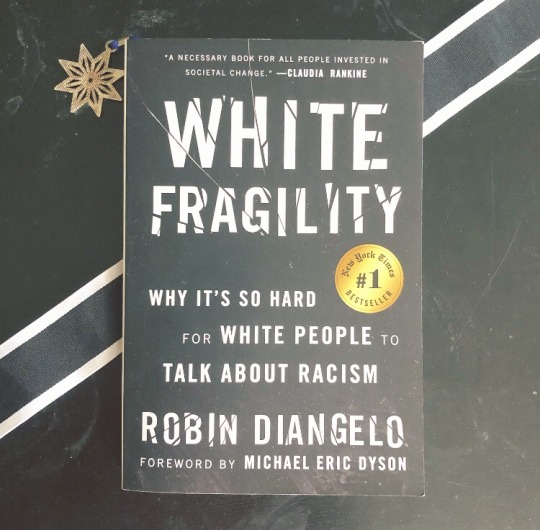
So, this book is an absolute MUST-READ.
I say this as a white woman. I say this as an advocate for societal change. And, I say this as a budding social worker and person of growth.
As I listed all above, I knew I was in for some things. Some lessons I had been opened to during my time in school and I was curious if there was anything further which this book could tell me (hint: there was). I knew there were things I was going to be uncomfortable learning (hint: one chapter completely made me put the book down because I didn’t even realize I had inflicted it in my time) however, I was ready to see where I could growth in helping install fundamental and needed change in my interactions across all boards (micro,mezzo, and macro).
Prepare to be uncomfortable if you’re reading this. However, also remember it is okay to be uncomfortable. Do not shy away from something that inherently we (referring specifically to my white audience) were brought up to avoid.
This book explains it perfectly.
#white fragility#robin diangelo#social sciences#blm#reading#read#booksta#bookstagram#bookstagrammer#reader#explore#trending#bookblog#mustread#brillant#nyt book review#nyt bestseller#bestseller#societal change#thought#perceptions#maturity#communication#community#micro#mexxo#macro#mindfulness#living mindfully#growth
7 notes
·
View notes